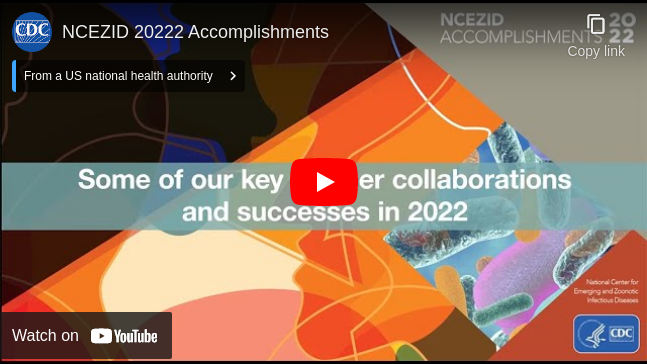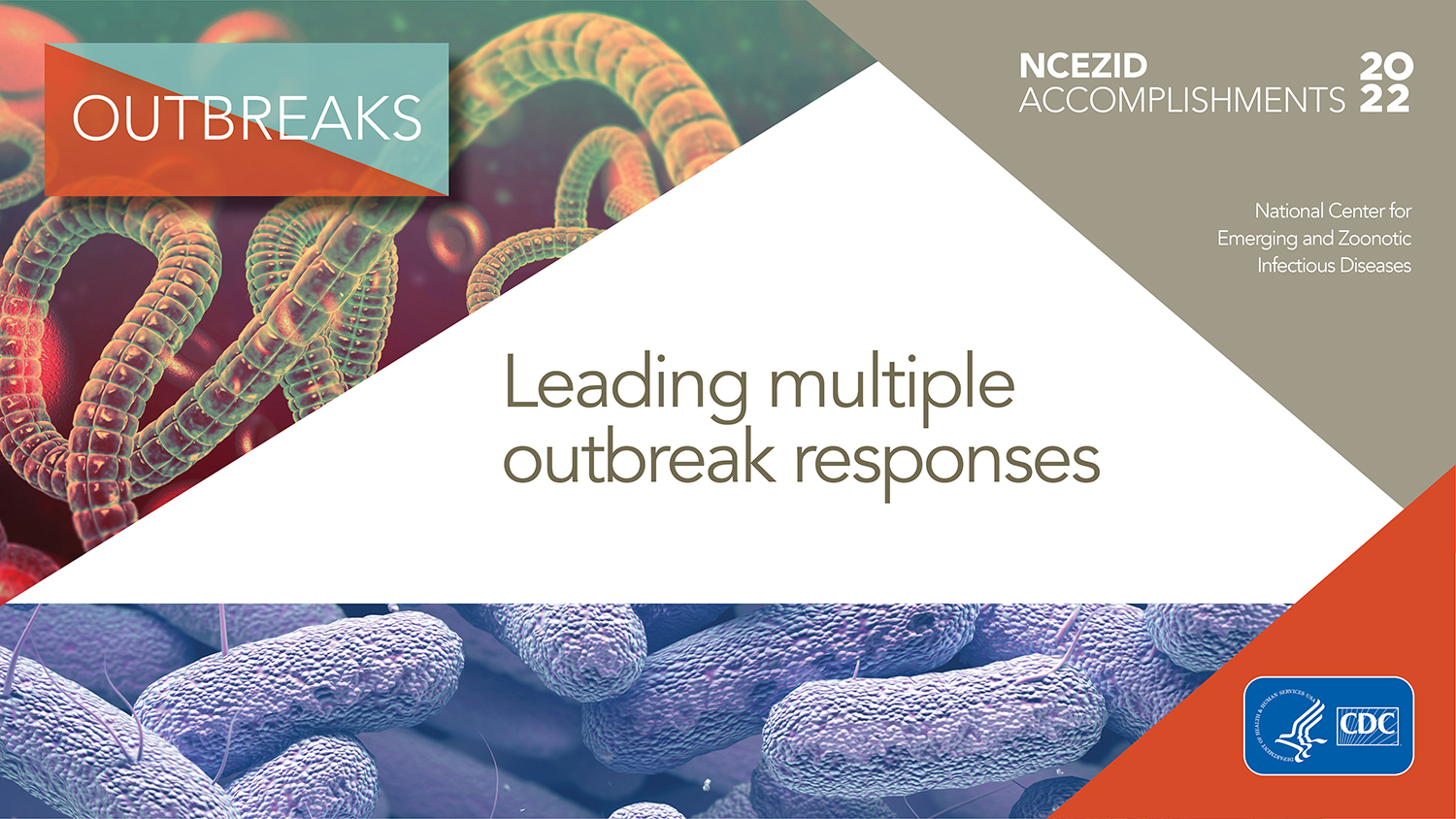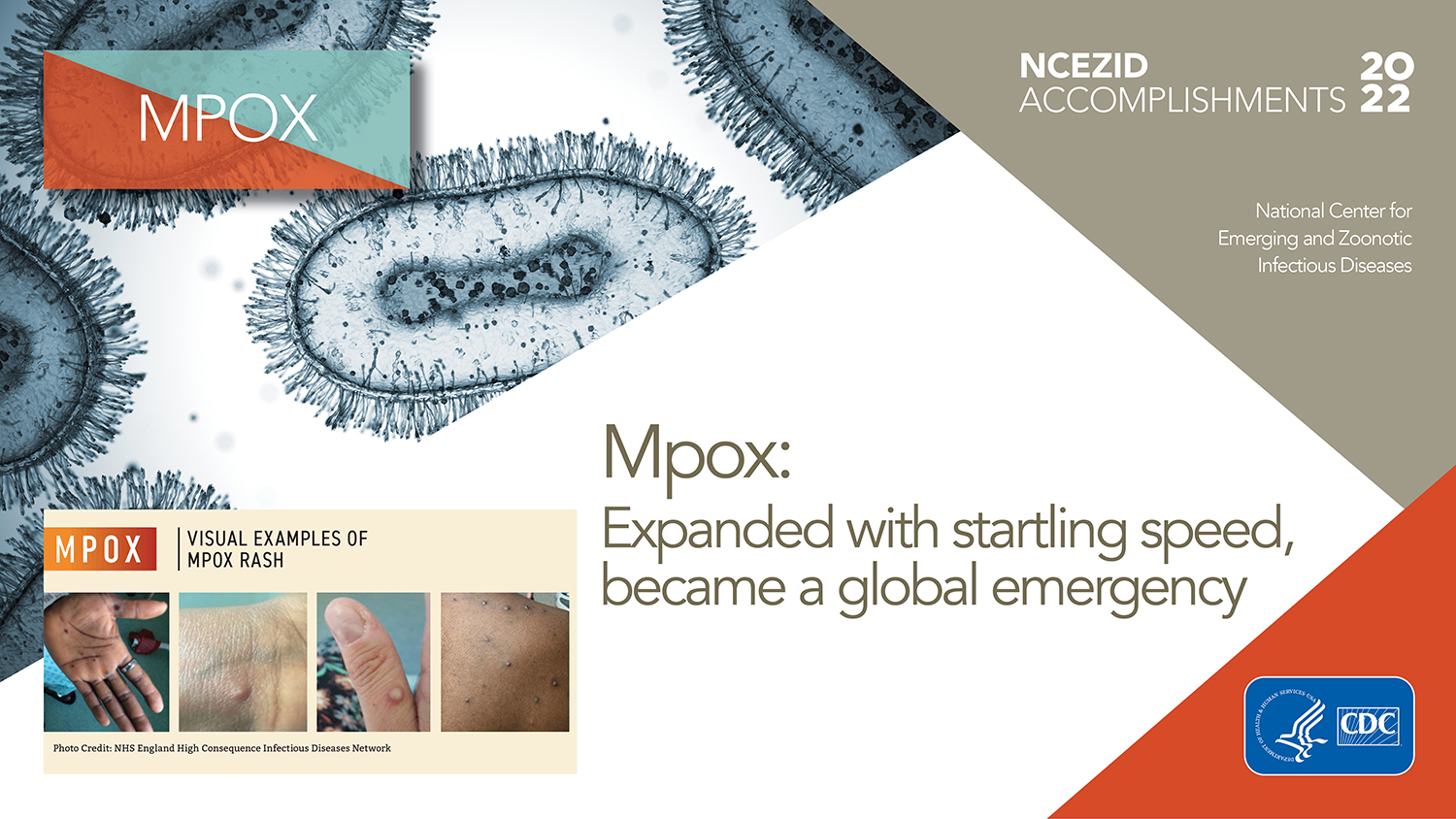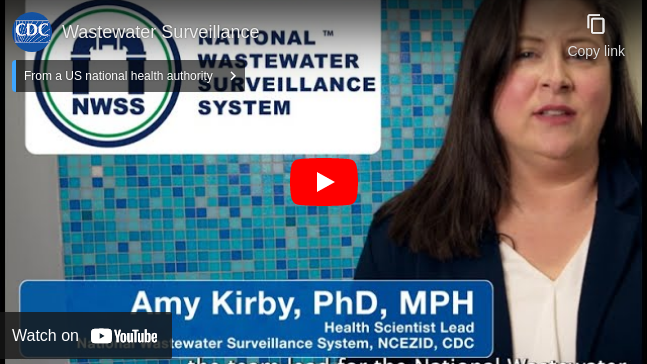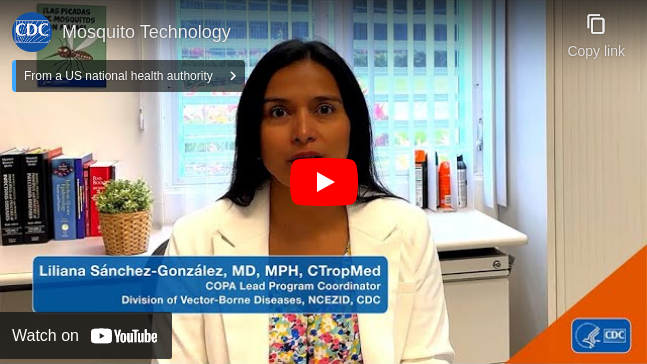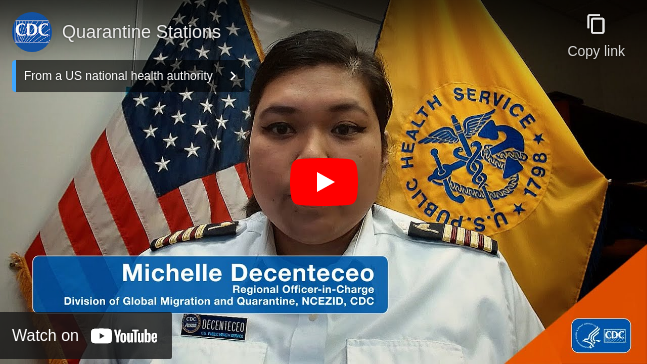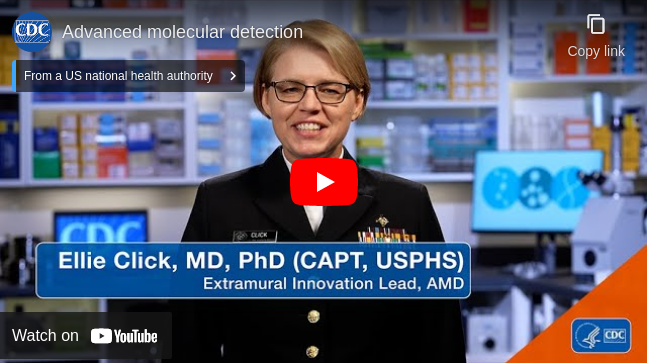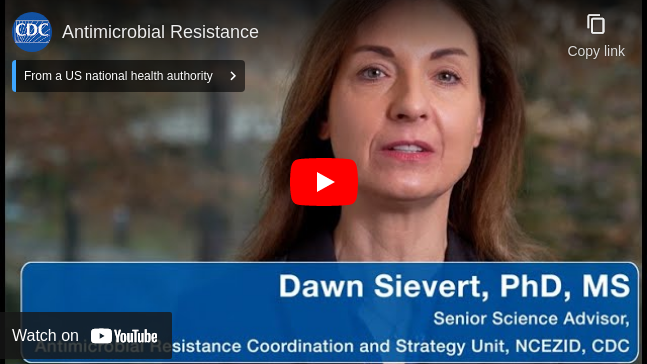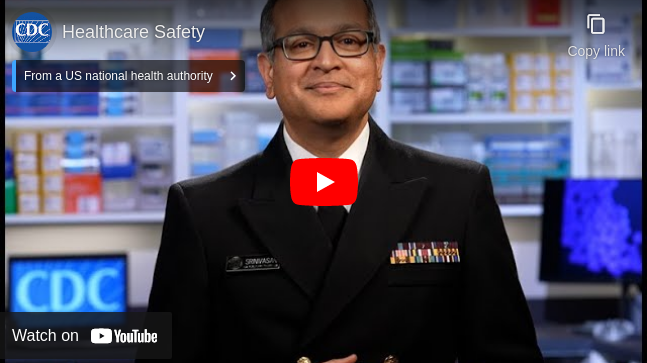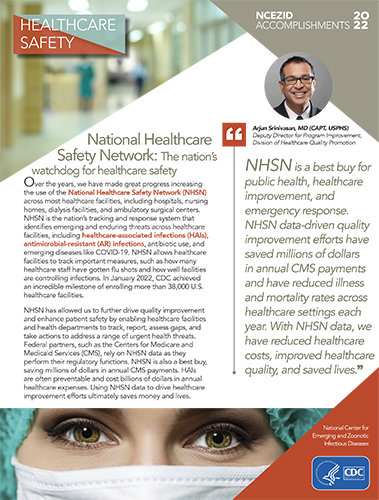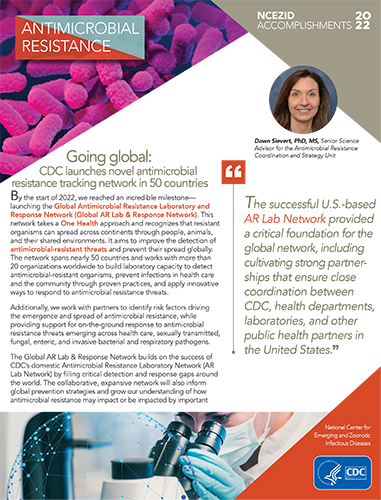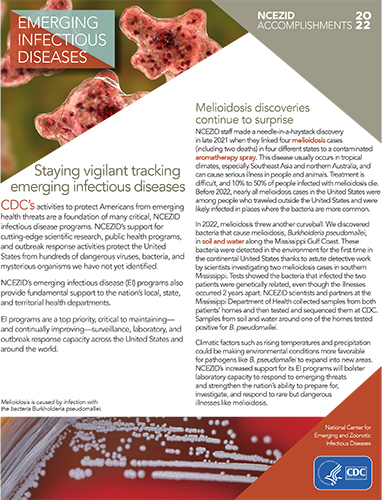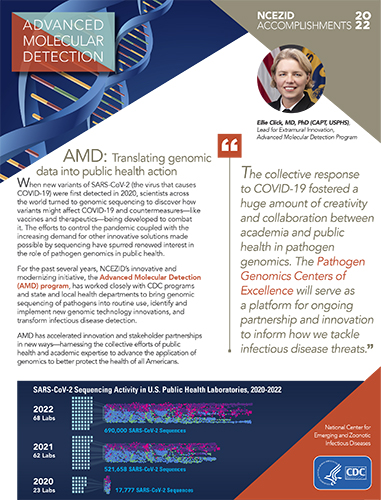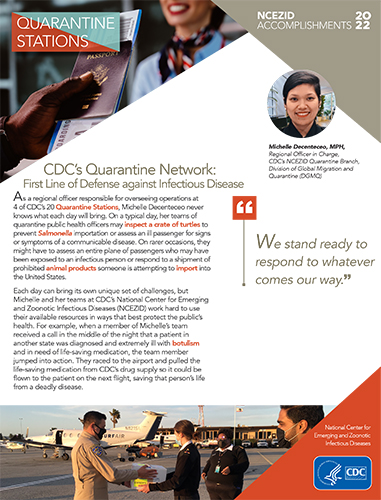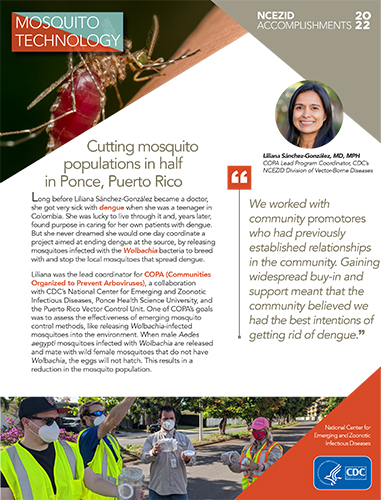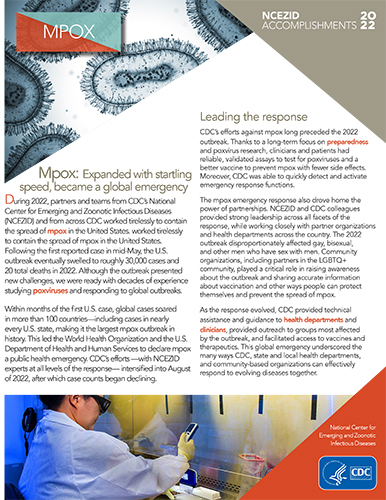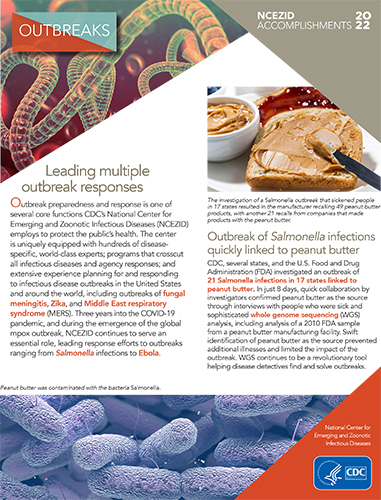NCEZID Accomplishments 2022 Partner Toolkit
CDC’s National Center for Emerging and Zoonotic Infectious Diseases (NCEZID) is sharing a multi-part series of accomplishment stories that highlight some of our center’s work on important health issues, key partner collaborations, and successes in 2022.
Sign up for the NCEZID newsletter and please consider sharing the newsletter sign-up information with your colleagues, members, and partners.
Follow @CDC_NCEZID on Twitter and share or re-Tweet posts.
Social media for partners
We invite our partners to join us in sharing with their constituents the NCEZID accomplishment stories. The social media messages, videos, and graphics below are for partners to use from their organization accounts across different platforms.
Please use #NCEZIDin2022 in Tweets to share content from the stories.
Social media tips
The copy samples can be used for Twitter, Facebook, Instagram, and LinkedIn posts. Keep in mind that URLs do not become active links when used on Instagram. To direct Instagram users to an external website, add the link to your bio and let your followers know to click the link in your bio for more information.
(Featured story for June 12-18, 2023)
Twitter
CDC’s National Center for Emerging and Zoonotic Infectious Diseases (#NCEZID) protects people by detecting and responding to emerging infections and disease outbreaks in the US and around the world. See highlights from #NCEZIDin2022 https://bit.ly/3IAgrz4
Facebook
CDC’s National Center for Emerging and Zoonotic Infectious Diseases (#NCEZID) protects people by detecting and responding to emerging infections and disease outbreaks. See highlights from #NCEZIDin2022. https://bit.ly/3IAgrz4
LinkedIn
CDC’s National Center for Emerging and Zoonotic Infectious Diseases (#NCEZID) protects people by detecting and responding to emerging infections and disease outbreaks in the US and around the world. See highlights from #NCEZIDin2022. https://bit.ly/3IAgrz4
(Featured story for May 22-28, 2023)
Twitter
From foodborne illnesses to Ebola, @CDC & its partners investigate hundreds of outbreaks every year. Find out how #NCEZIDin2022 investigated a Salmonella outbreak linked to peanut butter & took new approaches to Ebola prevention & response: https://bit.ly/3ABPg2u
Facebook
[Topic- Ebola outbreak]
NCEZID has responded to seven Ebola outbreaks in the past five years. Most recently, responding to an Ebola outbreak in Uganda in 2022, NCEZID launched a multi-country response effort including testing and vaccine and survivor studies. NCEZID continues to work with country partners to build their capacity to respond to Ebola through trainings and laboratory enhancements. Read more about CDC’s accomplishments during 2022 outbreak responses: https://bit.ly/3ABPg2u
[Topic- Foodborne outbreak]
Thanks to whole genome sequencing of pathogens—a revolutionary tool to solve outbreaks—CDC and partners confirmed the source of a 2022 Salmonella outbreak in just eight days. Learn more about CDC’s 2022 outbreak investigations: https://bit.ly/3ABPg2u
LinkedIn
CDC and its partners investigated hundreds of outbreaks in 2022. After multiple Ebola outbreaks over the years, CDC and country partners are putting the lessons learned to use. For example, they are combining new strategies such as vaccine studies with tried-and-true approaches like training public health workers on disease detection and lab testing. Read more about CDC’s 2022 outbreak response accomplishments: https://bit.ly/3ABPg2u
(Featured story for May 8-14, 2023)
Twitter
@CDC_NCEZID has decades of experience working on poxviruses worldwide. In the US mpox outbreak, experts have relied on partners and communities to promote vaccination and help control the spread of mpox. Learn more from #NCEZIDin2022: https://bit.ly/40KfM4v
Facebook
Through preparedness and partnerships, cases of mpox quickly declined during the fall of 2022 and into 2023. As we start to see cases again this spring, we can rely on those tools again to limit the resurgence of cases this summer.
CDC experts are equipped with a long history of studying poxviruses, including smallpox, and responding to outbreaks.
This historic work laid the framework for CDC’s initial response to the outbreak. Community organizations, including partners and individuals in the LGBTQ+ community, continue to play a critical role in raising awareness about the outbreak and sharing accurate information from CDC about vaccination and other prevention measures. Learn more about the powerful impact of these collaborations during the initial phase of the mpox response: https://bit.ly/40KfM4v
LinkedIn
Relying on the power of public health partnerships is key to containing the spread of mpox. When the first case of mpox was detected in May 2022, the United States already had reliable poxvirus tests and a vaccine to help prevent mpox thanks to CDC’s long-term smallpox focus on preparedness and research. However, it was community organizations, including partners in the LGBTQ+ community, that mobilized to put CDC’s expertise into action. Partners continue to work with communities to make them aware of the outbreak and share accurate information about CDC’s prevention. Read more about the initial phase of CDC’s mpox response: https://bit.ly/40KfM4v
(Featured story for May 8-14, 2023)
Twitter
The National Wastewater Surveillance System (NWSS) collects data from community wastewater systems that help detect COVID-19 variants such as Omicron and other diseases. Learn more from #NCEZIDin2022: https://bit.ly/3NkyDjI
Facebook
Launched in 2020, the National Wastewater Surveillance System (NWSS) now collects data from community wastewater systems that serve more than 2 out of 5 Americans, with plans to expand. In 2022, these data helped detect SARS-CoV-2 variants, including Omicron, and monitor other outbreaks like polio to help guide public health decisions.
Learn more about NWSS and other 2022 highlights from CDC’s National Center for Emerging and Zoonotic Infectious Diseases’ (NCEZID) 2022 Accomplishments: https://bit.ly/3NkyDjI
LinkedIn
Launched in 2020, the National Wastewater Surveillance System (NWSS) now collects data from community wastewater systems that serve more than 2 out of 5 Americans, with plans to expand. In 2022, these data helped detect SARS-CoV-2 variants, including Omicron, and other outbreaks like polio to help guide public health decisions.
Learn more about NWSS and other 2022 highlights from CDC’s National Center for Emerging and Zoonotic Infectious Diseases’ (NCEZID) 2022 Accomplishments: https://bit.ly/3NkyDjI
(Featured story for May 1-7, 2023)
Twitter
@CDC_NCEZID evaluated how releasing male mosquitoes infected with Wolbachia bacteria in Ponce, Puerto Rico impacted the mosquito population. In some areas, mosquitoes decreased by half. Read more: https://bit.ly/3oMfHjq #NCEZIDin2022
Facebook
Liliana Sánchez-González got very sick with dengue as a teenager growing up in Colombia. Decades later, she is fighting back in a big way. As the program coordinator of Communities Organized to Prevent Arboviruses (COPA)—a collaboration with CDC, Ponce Health Science University, and the Puerto Rico Vector Control Unit—she helped implement an innovative approach to reduce the mosquitoes that spread dengue virus.
Local promotores (community health workers) in Ponce, Puerto Rico, helped mobilize the community and communicate information about the release of male mosquitoes infected with Wolbachia bacteria in Ponce. When these mosquitoes mate with wild female mosquitoes that do not have Wolbachia, the eggs don’t hatch. As a result, the local population of mosquitoes dropped by 50% in some areas. Read more about the project and Liliana’s perspective: https://bit.ly/3oMfHjq
LinkedIn
Community promotores helped mobilize the community and communicate information in the local community in Ponce, Puerto Rico, about an innovative approach to controlling the mosquitoes that spread dengue.
Communities Organized to Prevent Arboviruses (COPA), a collaboration with CDC, Ponce Health Science University, and the Puerto Rico Vector Control Unit, released male mosquitoes infected with Wolbachia bacteria in Ponce. When these mosquitoes with Wolbachia mate with wild female mosquitoes that do not have Wolbachia, the eggs don’t hatch. The population of mosquitoes dropped by 50% in some areas of Ponce. Reducing the mosquito population could help prevent the spread of dengue. Learn more about this work: https://bit.ly/3oMfHjq
(Featured story for April 24-30, 2023)
Twitter
Whether it’s inspecting a crate of turtles to prevent Salmonella or assessing passengers for symptoms of disease, each day brings new challenges for CDC quarantine public health officers. Learn more from #NCEZIDin2022: https://bit.ly/3LkU4ja
Facebook
Whether it’s inspecting a crate of turtles to prevent Salmonella or assessing a passenger for symptoms of an infectious disease, each day brings opportunities to protect the public’s health for CDC’s Quarantine Public Health Officers like Michelle Decenteceo.
Michelle works in Chicago, at one of CDC’s 20 quarantine stations at US ports of entry, where she and her fellow quarantine public health officers oversee high volumes of international travelers and shipments of CDC-regulated items to prevent public health threats from entering our country. Read more about CDC’s quarantine stations and the dedicated public health officers who staff them in NCEZID’s 2022 Accomplishments: https://bit.ly/3LkU4ja
LinkedIn
In 2022, CDC quarantine station staff screened 11,000 travelers for Ebola, supported 49 US ports of entry with communicable disease response plans to prepare for outbreaks, provided public health response capacity for all 300+ US ports of entry, and deployed 165 life-saving drug shipments to treat people with life-threatening diseases for which treatments are not commercially available.
Read more about how CDC’s quarantine stations are meeting the expanding demands of our increasingly mobile world in NCEZID’s 2022 Accomplishments: https://bit.ly/3LkU4ja
(Featured story for April 17-23, 2023)
Twitter
From 2020-22, the number of public health labs sequencing SARS-CoV-2 & emerging variants nearly tripled, from 23 to 68, thanks to support from @CDC_NCEZID Advanced Molecular Detection program (@CDC_AMD). Learn more #NCEZIDin2022 https://bit.ly/3oevQhb
Facebook
From 2020 to 2022, the number of public health laboratories sequencing SARS-CoV-2 and emerging variants nearly tripled, from 23 to 68, thanks to support for NCEZID’s Advanced Molecular Detection program. Read about this and other advances made by NCEZID and partners in NCEZID’s 2022 Accomplishments: https://bit.ly/3oevQhb
LinkedIn
In 2022, CDC’s National Center for Emerging Zoonotic and Infectious Diseases (NCEZID) launched the Pathogen Genomics Centers of Excellence (PGCoE), a network of state and local health departments partnered with academic institutions to enhance the capacity for genomic sequencing of pathogens and apply scientific advancements locally. These partnerships lead to innovative applications of genomic epidemiology in public health. Read about this and other advances made by NCEZID and partners in NCEZID’s 2022 Accomplishments: https://bit.ly/3oevQhb
(Featured story for April 10-16, 2023)
Twitter
NCEZID supports US labs to identify & prevent emerging public health threats. #NCEZIDin2022 confirmed brain-eating ameba cases further expanding into northern US states & discovered the bacteria that cause melioidosis in US soil for the first time. More: https://bit.ly/3nW8htD.
Facebook
NCEZID’s emerging infectious disease programs support local health departments and labs to detect, contain, and respond to emerging threats like melioidosis. In 2021, NCEZID and partners identified aromatherapy spray as the source of 4 reported melioidosis cases in the US. A year later, experts found the bacteria that cause melioidosis in US soil for the first time. Melioidosis is a deadly and hard-to-treat infection historically found outside of the US in tropical climates. Read more about how NCEZID and partners combat emerging infections in NCEZID’s 2022 Accomplishments: https://bit.ly/3nW8htD.
LinkedIn
NCEZID’s emerging infectious disease programs support local health departments and labs to detect, contain, and respond to emerging threats. In 2022, we saw the growing importance of this work when two different deadly disease threats were found in areas where they had not been seen previously.
Of three Naegleria fowleri (also known as brain-eating ameba) cases in 2022, two were among the northernmost cases ever reported.
Also, Burkholderia pseudomallei (the bacteria that cause melioidosis) was found in US soil for the first time. This deadly infection had historically been found in tropical foreign climates. Read more about how NCEZID and partners are fighting emerging infections to protect public health: https://bit.ly/3nW8htD.
(Featured story for April 3-9, 2023)
Twitter
In 2022, NCEZID launched the Global Antimicrobial Resistance Laboratory & Response Network. Working with partners, we can better understand relationships between global issues like health inequities & AR. Read highlights from #NCEZIDin2022: https://bit.ly/3ZrvctB
Facebook
Antimicrobial resistance (AR) is an urgent global public health threat that killed at least 1.27 million people worldwide in 2019. AR can spread quickly across continents. In 2022, NCEZID launched the Global Antimicrobial Resistance Laboratory and Response Network to detect, prevent, and control the emergence and spread of AR worldwide. Learn more about NCEZID’s 2022 Accomplishments: https://bit.ly/3ZrvctB
LinkedIn
Antimicrobial resistance killed at least 1.27 million people worldwide in 2019 and is an urgent public health threat that can spread quickly across continents. In 2022, NCEZID launched the Global Antimicrobial Resistance Laboratory and Response Network to detect, prevent, and control the spread of antimicrobial resistance around the world. Learn more about NCEZID’s 2022 Accomplishment: https://bit.ly/3ZrvctB
(Featured story for March 27-April 2, 2023)
Twitter
With 38,000+ healthcare facilities enrolled, National Healthcare Safety Network data can help identify health threats, address inequities & track improvements that can save lives. See highlights from #NCEZIDin2022 https://bit.ly/3JQWbck
Facebook
With 38,000+ healthcare facilities enrolled in the National Healthcare Safety Network (NHSN) in 2022, CDC and partners can use these data to track improvements, address inequities, and act on urgent health threats. Data from this network helped ensure nursing homes had access to needed COVID-19 vaccines and supplies.
Using NHSN data to drive healthcare improvement efforts saves money and lives. See more highlights from CDC’s National Center for Emerging and Zoonotic Infectious Diseases’ Accomplishments for 2022: https://bit.ly/3JQWbck
LinkedIn
With 38,000+ healthcare facilities enrolled in the National Healthcare Safety Network (NHSN) in 2022, CDC and partners can use these data to track improvements, address inequities, and act on urgent health threats. Data from this network helped ensure nursing homes had access to needed COVID-19 vaccines and supplies.
Using NHSN data to drive healthcare improvement efforts saves money and lives. See more highlights from CDC’s National Center for Emerging and Zoonotic Infectious Diseases Accomplishments for 2022: https://bit.ly/3JQWbck
